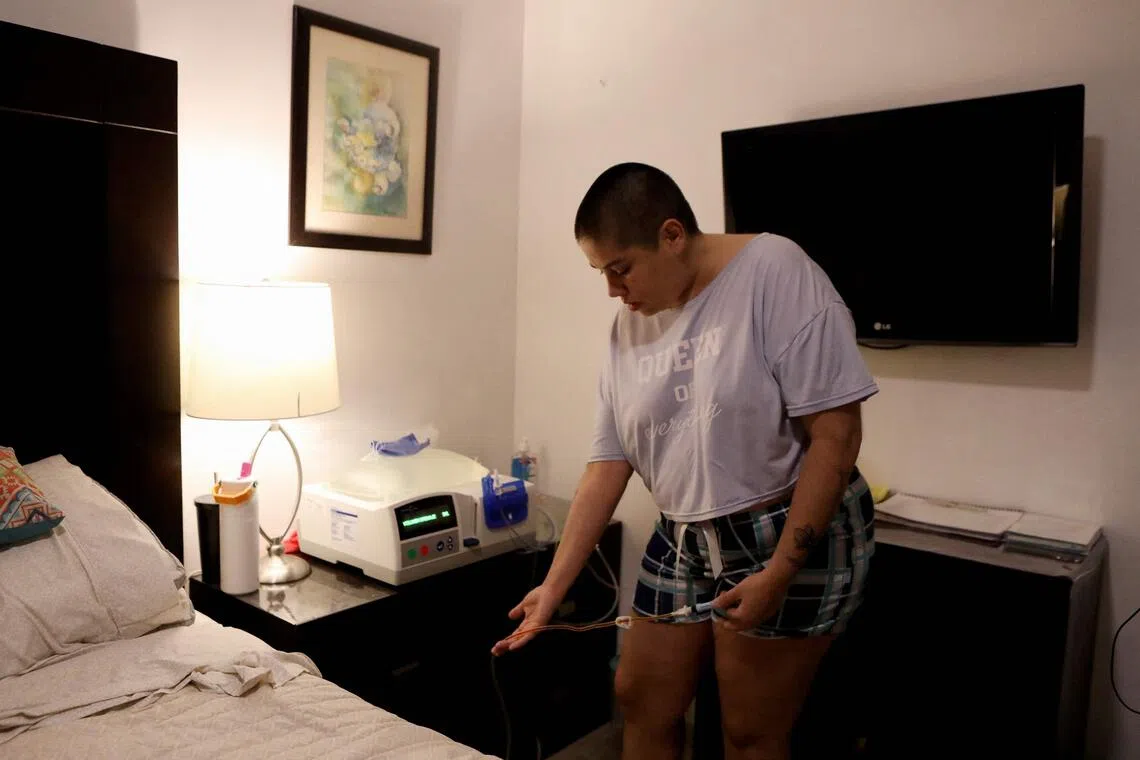Resilient young woman leads fight for euthanasia in Mexico
Sign up now: Get ST's newsletters delivered to your inbox

Professor Samara Martinez spends 10 hours a day hooked up to a dialysis machine to survive, and has been using social media to advocate for the legalisation of euthanasia in Mexico.
PHOTO: AFP
CHIHUAHUA, Mexico - Professor Samara Martinez, a young Mexican woman who is sick and dying, smiles as she asks her many TikTok followers a difficult question.
The 30-year-old lives with several chronic and degenerative diseases, including kidney failure, and spends 10 hours a day hooked up to a dialysis machine to survive.
“Instead of seeking euthanasia, why don’t I just unplug the machine and say goodbye?“ Prof Martinez, a journalist by trade, says in her video.
She then explains to her nearly 400,000 followers what it is like to suffer from several terminal diseases – and why she is spearheading a campaign to legalise a person’s right to euthanasia in Mexico.
As she prepares to answer her initial question, the camera zooms in on Prof Martinez’s face for a close-up.
“Because I do not want to suffer and I want to die with dignity,” she says.
A paradox is at work here: As she advocates for such a gravely serious issue as death, Prof Martinez does so with vigour, enthusiasm and creativity over social media.
Her work helps her “stay alive”, Prof Martinez told AFP during an interview at her home in the city of Chihuahua in northern Mexico.
“Social media also serves to change the world,” said Prof Martinez, who feels that before she became a social media influencer, she was an “agent of change”.
After undergoing two failed kidney transplants, and with no possibility of being cured, in August she launched her campaign for Mexico to give people the right to die with dignity.
“I am going to be the person who legalises euthanasia in Mexico,” said Prof Martinez.
She expressed confidence that she will succeed because, unlike previous campaigns with the same goal, this time it is a sick patient at the forefront.
Earlier in October, Uruguay became the first country in Latin America
Colombia and Ecuador did the same in 1997 and 2024, respectively, through court rulings.
For love and respect
After more than a decade striving to get healthy, deciding she was ready to die posed a dilemma for Prof Martinez.
She asked her parents what they thought. “We support you,” she said they told her.
“I am doing it for myself, and for the respect I have for my body, and because I love myself so much. That is what is behind all this,” said Prof Martinez.
With stoicism and good humour that could stun the many people who watch her online, Prof Martinez explains her end-of-life decision.
“It is not that I gave up. Rather, I have unblocked that part of understanding which says death is not an enemy, that it is not pain. Death is a sister, a friend, and one embraces it.”
Sitting in her office at a university in Chihuahua, where she is tenured, Prof Martinez analyses her options.
She says in a steady voice that no one can make her keep doing dialysis.
“I would take 15 days to die, but those would be 15 days of agony and suffering because your whole body is poisoned. You can drown in your own liquids. It is a very undignified death,” said Prof Martinez.
To stop dialysis, she said, would be a form of passive euthanasia – withholding treatment that would keep a dying person alive.
Another option is to resort to a law in Mexico under which a person sound of mind can ask that their life not be prolonged artificially and they only be given palliative care until they die.
This week, she herself will present to the Mexican Senate a Bill to make euthanasia part of Mexico’s body of law, letting people decide when they want to die and to do so without unnecessary suffering.
The lower chamber of Congress must also approve the initiative.
“It is high time we stopped penalising compassion,” said Prof Martinez.
She has amassed 118,000 signatures on a petition backing her idea and is now trying to win over lawmakers.
When the time comes, Prof Martinez envisions expiring by the sea, at dusk, with a quiet ceremony.
“A celebration of life with my family, surrounded by people I love and who love me, and going peacefully, with no pain,” she said. AFP


